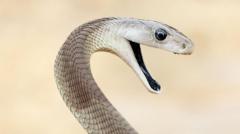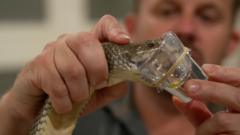Tim Friede's extraordinary journey has resulted in a groundbreaking antivenom derived from his own blood, showing promise against various snake toxins. Research indicates that this could significantly change current treatments, which typically target specific snake species, thus paving the way for a one-size-fits-all therapy approach.
Groundbreaking Antivenom Derived from Unique Human Experimentation

Groundbreaking Antivenom Derived from Unique Human Experimentation
A US man’s self-exposure to snake venom has opened avenues for a potential universal antivenom that may save lives worldwide.
A black mamba is often deemed the world's deadliest snake, yet research emerging from the unusual practices of a US man might revolutionize the way snakebites are treated. Tim Friede has committed nearly two decades of his life to injecting himself with snake venom, leading to the development of what scientists are deeming an "unparalleled" antivenom.
Research indicates that antibodies in Friede's blood have provided remarkable protection in animal tests against lethal doses from various snake species. Current antivenoms are species-specific, but Friede's unique circumstances could signify a profound shift towards creating a universal antivenom. Each year, snakebites contribute to around 14,000 fatalities globally, with even more individuals facing serious consequences such as amputations or disabilities.
Over the course of his 18-year journey, Friede has endured over 200 snake bites and approximately 700 venom injections from several of the world's most dangerous snakes, including various mamba species, cobras, and kraits. While his initial intention was to develop immunity for handling snakes, tragic incidents—including a near-fatal cobra bite—shifted his focus toward research aimed at improving treatment options for snakebite victims worldwide.
In contemporary antivenom production, small venom doses are injected into animals like horses, whose immune systems create antibodies that are then harvested. Dangerous variability exists not only across species but also within populations of the same species, complicating treatment efforts. Researchers began exploring broadly neutralising antibodies—those that can target more than one type of toxin—from Friede's blood.
Dr. Jacob Glanville, the CEO of biotechnology firm Centivax, was motivated to connect with Friede, believing he may possess the antibodies necessary for the universal treatment for snakebites. Ethical approval was granted for the blood study, provided it involved only blood withdrawal, avoiding additional venom exposure for Friede.
Focusing initially on elapids—the family of snakes that includes coral snakes and mambas—researchers identified two broadly neutralising antibodies in Friede's blood. These antibodies are effective against two classes of neurotoxins, including a supplement drug that combats a third toxin type. In experiments with mice exposed to injections from 19 species identified by the World Health Organization, the antibody cocktail yielded survival rates against fatal venom doses from 13 of those species, with partial protection against the others.
Dr. Glanville described the study's breadth of protection as "unparalleled," remarking that it could potentially apply to numerous elapids that currently lack effective antivenoms. As the research progresses, efforts to refine the antibody effectiveness continue, with hopes of developing a single treatment for both elapids and vipers—another snake family that utilizes different toxin types.
Experts caution that despite the promising results, more work remains before human application can begin, emphasizing the importance of extensive testing. Nevertheless, Friede expressed profound satisfaction, stating, “I’m doing something good for humanity and that was very important to me. I’m proud of it. It’s pretty cool.”
With the potential to save lives on a global scale, this groundbreaking research showcases the intersection of human perseverance and scientific innovation in tackling one of the world’s lethal animal threats.






